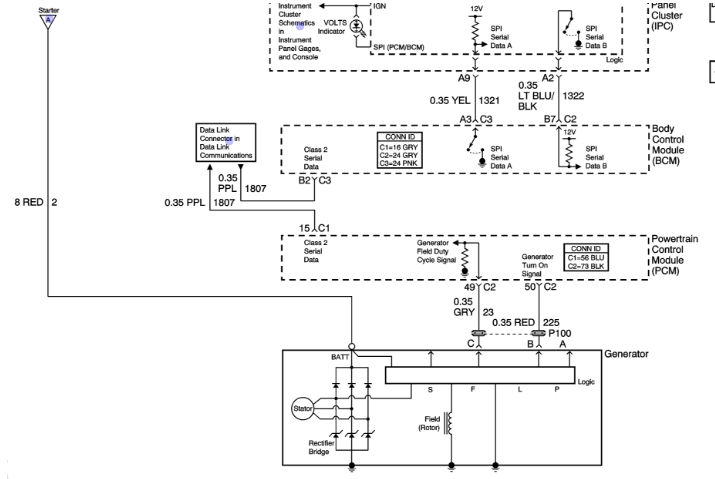*** Restricting New Posts to SD Premium Members ONLY *** (09 May 2025)
Just made a new account? Can't post? Click above.
2004 Chevy Classic Charging light on at idle, goes away when revving
- Stinky
-
Topic Author
- Offline
- New Member
-

- Posts: 10
- Thank you received: 0
I checked the voltage off the battery at idle and indeed it was 11.6-11.7 volts. I had someone rev the engine up past 2000rpm and the light went out while revved and it still measured 11.7 or maybe 0.2 volts lower if anything, if the belt was slipping I'd expect to at least get a little bit of output when revving it, nothing though. The battery cables are on tight and there is no corrosion that I can see. I could barely see the ground connection on the alternator but I couldn't reach it so I took my meter and checked for resistance between a nearby ground and the case of the alternator. Zero resistance. Where do I go from here?
EDIT: Just did two tests. I did a voltage drop test by connecting the positive lead to the output of the alternator and negative lead to battery positive. It read a few milivolts at most. Seems the connections are good?
The other test I did involved connecting the positive lead to the alternator output and negative lead to a nearby ground. Car on or off, load or no load it read the same as battery voltage. Does this mean the alternator is bad or is there something else I could be missing? Perhaps I did a test wrong?
Please Log in or Create an account to join the conversation.
- Tyler
-

- Offline
- Moderator
-

- Full time HACK since 2012
- Posts: 6042
- Thank you received: 1519
Here's a diagram for reference:
You already know that the L-terminal circuit is working correctly because the battery light comes and goes. But, you can still test this circuit by turning the key on and disconnecting the alternator field connector. The red wire should show 5V on your multimeter.
The F-terminal is a feedback circuit and won't cause the alternator not to charge. Testing this circuit is best done with a scan tool that can read OEM data.
The only other thing I'd suggest is voltage drop checking the case to B- while it's not charging. One lead on the case, the other on B-. Should easily be less than 300mV. If that passes, it's alternator time.
Please Log in or Create an account to join the conversation.
- Stinky
-
Topic Author
- Offline
- New Member
-

- Posts: 10
- Thank you received: 0
I did the voltage drop test between battery negative and case ground and it read a few milivolts at most.
I don't have a scantool nor a scope so I have no way of knowing what the PCM is telling it to do, which judging from the schematic if I understand it correctly doesn't tell it to do anything anyway.
Please Log in or Create an account to join the conversation.
- Tyler
-

- Offline
- Moderator
-

- Full time HACK since 2012
- Posts: 6042
- Thank you received: 1519
So just to be sure I'm understanding correctly the "Generator turn on signal" is going to the PCM and not coming from it correct?
It's kinda a dual function circuit. :silly: The turn on signal actually does come from the PCM. No pulse width fanciness - the PCM just puts 5V on that red wire to tell the alternator to charge. The regulator in the alternator does the rest.
When the regulator detects a failure, it grounds that same 5V, pulling it to 0V. The PCM sees this, sets a fault code and tells the instrument cluster to turn the battery light on.
That's why we can infer that the L-terminal (turn on signal) is likely OK. It's not shorted to ground, otherwise the battery light would be on all the time. It's not open, otherwise the battery light wouldn't come and go as you raise the engine speed. That just leaves a multimeter check.
I did the voltage drop test between battery negative and case ground and it read a few milivolts at most.
Love it.
I don't have a scantool nor a scope so I have no way of knowing what the PCM is telling it to do, which judging from the schematic if I understand it correctly doesn't tell it to do anything anyway.
No worries, the scan tool isn't crucial in this case. Your multimeter will do everything we need.
Please Log in or Create an account to join the conversation.
- Stinky
-
Topic Author
- Offline
- New Member
-

- Posts: 10
- Thank you received: 0
EDIT: I disconnected the electrical connector from the alternator and probed the red wire as suggested with the key in the on position. It read exactly 4.99 volts.
This good? www.rockauto.com/en/moreinfo.php?pk=1797...1642&pt=2412&jsn=912
Please Log in or Create an account to join the conversation.
- Tyler
-

- Offline
- Moderator
-

- Full time HACK since 2012
- Posts: 6042
- Thank you received: 1519
EDIT: I disconnected the electrical connector from the alternator and probed the red wire as suggested with the key in the on position. It read exactly 4.99 volts.
Perfect.
This good? www.rockauto.com/en/moreinfo.php?pk=1797...1642&pt=2412&jsn=912
Looks OK? Of the options available on RockAuto, it's a toss up between Delco and Bosch. I've had good luck with both.
Please Log in or Create an account to join the conversation.

